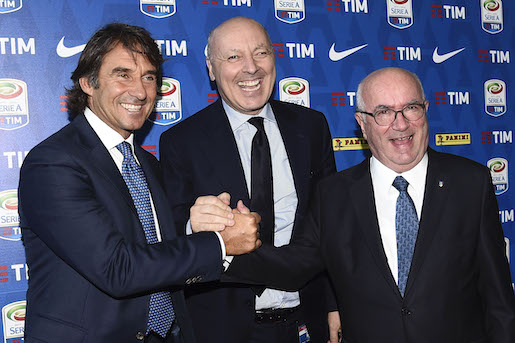Imagine for a moment – Sassuolo as a team in American sports. It would never reinforce a team it would legitimately see as its own competitor – its general manager would look like an idiot and never be hired again.

While defining the boundaries of a capitalist system is increasingly difficult – with sociologists trying to distinguish between soziale marktwirtshaft, state capitalism, and so on – a common argument is that US capitalism is “extreme” and that its repudiation of social safety nets runs counter to basic principles such as solidarity and compassion. At times, it is hard to argue otherwise.
But America remains at the forefront of innovation, and companies here thrive in the absence of red tape and government regulation – one of the reasons why dynasties are rare and most millionaires and billionaires today are self-made tech entrepreneurs and not scions of rich families.
It goes without saying that innovation – and ferocious competition – produce winners and losers, but the very concept of winning and losing is central to the American way of life and it sounds fair to most Americans as long as people are given equal opportunities (whether that happens or not nowadays is a matter for discussion).
In sports, the very idea of a capitalist, competitive system with equal opportunities is exemplified by the NBA, where teams split TV rights equally and have a salary cap. There are no transfer fees, just contracts that can be swapped and free agents that can be signed. There is a yearly draft that ensures no team is ever precluded from creating a winning roster. And there is a luxury tax that punishes the big spenders, rather than rewarding them. In such a system, the best general managers are the ones that maximize results given the same amount of resources, and it’s easy to see how it would reward the most capable ones.
Italy works differently. Italian capitalism is, like the German one, a corporative system. It is not state capitalism because the government rarely maintains direct control of companies. But it is heavily skewed towards public relations, and is structured around a group of “industry leaders” – mostly families that have made their money generations ago – who control the markets, seize the opportunities thanks to inside information, monopolize the flow of money from the banking system, and exercises regulatory capture.
Think of the not particularly gifted manager that was in charge of Italy’s 1990’s world cup, Alitalia, and Cinzano, who is still tapped for a score of high-end jobs and was able to snatch a license to run trains on a high-speed line paid by the state that directly competed with the state-owned company. Think of the pressure from a former government minister to a major bank to acquire a small, local bank that had gone underwater. Think of a tip on the timing of a new regulation, from which a tycoon profited by making a successful trade on the Italian stock exchange. Think of investors that poured money into a failed venture started by a notorious scion of a wealthy family – which lost most of its shareholder value making expensive sunglasses: these investors probably anticipated the losses but did not refrain from investing believing, perhaps correctly, that splurging on that company would have helped them cementing relationships with the elected circle.
Now think of this – how could Serie A not reflect Italy’s culture? Where relationships matter more than your product or service for your entrepreneurial success, where innovation is confined to small niches, where companies are scooped up by foreign funds as soon as they reach a decent size because the domestic capital pool is focused on financing failed ventures, there is no chance it could ever resemble the NBA.
In such a country, it is perfectly normal that the President of a lesser football club offers – as a nice favor – one of his best players to the team that dominates the league – in exchange for nothing tangible, at least at first sight. It is perfectly normal just as it is perfectly normal that an airline sucks up 10 billion in public capital without any prospects of profitability, under the illuminated guidance of practically every big name in Italian capitalism.
In such a country, it would be crazy to think that a sport league could work in any other way. It’s ingrained in the “competitive” culture of Italian teams – and supporters, and voters. You can easily grasp this from Neapolitan soccer fans’ reaction to last year’s last game, when Verona outplayed Napoli for a draw that kept the Azzurri out of Champions League football this year. Verona, they say, should have taken the game more lightly given that it had nothing to gain. It is expected if you look at the political system, where no party wins the elections and no party loses it – it’s always about finding a compromise. The winner takes it all culture permeates America, but it’s nowhere to be seen in Italy, where power is shared and distributed.
Imagine for a moment – Sassuolo as a team in American sports. It would never reinforce a team it would legitimately see as its own competitor – its general manager would look like an idiot and never be hired again. But in a system where winning is frowned upon, and absolute victory is usually seen with disdain, where capitalism is not about driving your competitor out of the market, but about entertaining relations with him, where teams are supposed to “lay down their weapons” if they don’t have a reason to fight – in that system, Sassuolo and Juventus did exactly what they were supposed to do.
